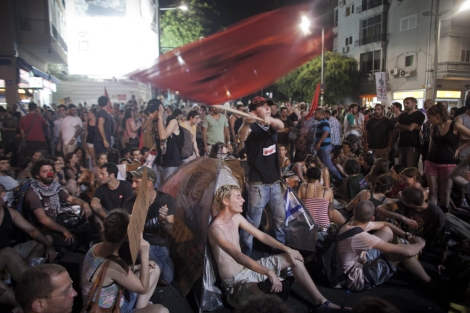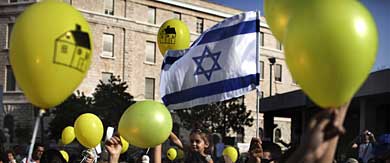The 'outraged' who lead the largest social protest in the history of Israel are preparing a document with their demands to present to Prime Minister Benjamin Netanyahu said Tuesday the newspaper Haaretz. The text is being drafted by the leaders of the protest movement, initiated last 14 days in a camp in Tel Aviv by the prices of housing and that has been gaining up between various sectors of the population.
Student representatives are also involved and other activist groups. Economists and other experts have been consulted to formulate a series of demands in the areas of housing, welfare, education, health and economic policy. The claims are presented along with their estimated cost for the state to defend the benefits of its implementation outweigh the initial costs, according to a draft obtained by the newspaper.
The 'angry' they want an amendment to the law requiring construction contractors to build "affordable housing", a gradual reduction of indirect taxes, the revaluation of the processes of privatization process and increase the minimum wage to half the average wage, currently 8698 shekels.
Also among their demands an increase in inspectors, firefighters, police, teachers and social workers and a reduction in the number of students per classroom. Netanyahu on Sunday announced the creation of a ministerial team to negotiate with 'angry', a day after 150,000 people took to the streets in the biggest demonstration unrelated to the conflict in the Middle East of the country's history.
The prime minister wants to receive or negotiate with them because he is "convinced" that "act purely for political reasons" in order to force him to resign, said the newspaper an unidentified source who spoke with him recently. Who has done so yesterday, is the country's president, Shimon Peres, who praised them and said their protest is not "artificial", but "genuine and serious." "What impressed me most is your innocence.
I think. I also believe that most people are surprised by the seriousness of the problem. The general impression is that the middle class can do without. They did not know how serious the issue," said. The Israeli president said that the protest has "won the hearts of the people" because it does not resort to violence and therefore "honors democracy." In the interview, the president of the student group, Itzik Shmuli, insisted that the mobilization "is not a personal issue or have a hidden political agenda", but seeks only "to persuade the Government to pass a slightly aggressive economy more human look at the numbers to look at people."
"What we all have in common is that ultimately, we want to see Israel as our home. We are fighting for the right to build a future in Israel," he said. Dafni Lif, the initiator of the protest, insisted that not only defend the interests of the middle class, but also the most vulnerable sectors, and that Israeli society "and not ashamed of it costs to get ahead." The protest also now has the public support of the Prince of Asturias Award writer Amos Oz, who in an open letter published in Haaretz report the economic turnaround experienced by Israel since the eighties, which resulted in the egalitarian society of the three first decades of statehood.



Student representatives are also involved and other activist groups. Economists and other experts have been consulted to formulate a series of demands in the areas of housing, welfare, education, health and economic policy. The claims are presented along with their estimated cost for the state to defend the benefits of its implementation outweigh the initial costs, according to a draft obtained by the newspaper.
The 'angry' they want an amendment to the law requiring construction contractors to build "affordable housing", a gradual reduction of indirect taxes, the revaluation of the processes of privatization process and increase the minimum wage to half the average wage, currently 8698 shekels.
Also among their demands an increase in inspectors, firefighters, police, teachers and social workers and a reduction in the number of students per classroom. Netanyahu on Sunday announced the creation of a ministerial team to negotiate with 'angry', a day after 150,000 people took to the streets in the biggest demonstration unrelated to the conflict in the Middle East of the country's history.
The prime minister wants to receive or negotiate with them because he is "convinced" that "act purely for political reasons" in order to force him to resign, said the newspaper an unidentified source who spoke with him recently. Who has done so yesterday, is the country's president, Shimon Peres, who praised them and said their protest is not "artificial", but "genuine and serious." "What impressed me most is your innocence.
I think. I also believe that most people are surprised by the seriousness of the problem. The general impression is that the middle class can do without. They did not know how serious the issue," said. The Israeli president said that the protest has "won the hearts of the people" because it does not resort to violence and therefore "honors democracy." In the interview, the president of the student group, Itzik Shmuli, insisted that the mobilization "is not a personal issue or have a hidden political agenda", but seeks only "to persuade the Government to pass a slightly aggressive economy more human look at the numbers to look at people."
"What we all have in common is that ultimately, we want to see Israel as our home. We are fighting for the right to build a future in Israel," he said. Dafni Lif, the initiator of the protest, insisted that not only defend the interests of the middle class, but also the most vulnerable sectors, and that Israeli society "and not ashamed of it costs to get ahead." The protest also now has the public support of the Prince of Asturias Award writer Amos Oz, who in an open letter published in Haaretz report the economic turnaround experienced by Israel since the eighties, which resulted in the egalitarian society of the three first decades of statehood.



- US, Israel Push to Avert Palestinian UN Bid - Voice of America (02/08/2011)
- A 'Dramatic Turnabout' by Netanyahu on Peace Terms? Not Quite (02/08/2011)
- A 'Dramatic Turnabout' by Netanyahu on Peace Terms? Not Quite (02/08/2011)
- Netanyahu: We're Keeping Our Promise (02/08/2011)
- A 'Dramatic Turnabout' by Netanyahu on Peace Terms? Not Quite (02/08/2011)
No comments:
Post a Comment